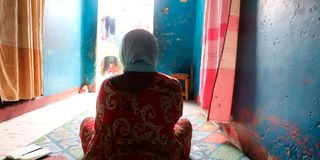Online sexual abuse of children is surging. Who will stop it?

Jairus*, a 17-year old boy who was sexually molested.
What you need to know:
- As many children continue to be more reliant than ever on the internet for school, recreation and social connection, reports of online sexual abuse of the young ones have exploded.
- Even worse, many cases of such abuse are going unreported due to stigmatisation, law enforcers’ laxity and cultural taboos.
The perfect birthday gift for a school-going child is increasingly becoming the smartphone because it provides freedom to access all kinds of online entertainment while also making learning easier.
But here is a huge caveat: Through these gadgets, many children under the age of 18 have been sexually exploited, assaulted and abused, making the vice a huge public health problem.
Take 17-year-old Jairus* for instance, who found himself in a disturbing encounter, just through the smartphone. It is an occurrence that has since changed how he relates with people in public. Now, he lives with regret on why he had to share his details; with a question that keeps lingering in his mind, “Could it have been different had I not shared my number?” A year later, he vividly remembers the series of events that led to him to being sexually assaulted.
Travelling from Nairobi to Mombasa to join his father for his Form One intake in February this year, he met a man whom he noticed was looking at him in a suggestive manner when he boarded the bus in Nairobi.
During the journey, the stranger kept checking on him, something that he found very awful. The man went to the extent of even requesting to buy Jairus something to eat. But he declined.
On reaching his destination, the man asked for his mobile contact, which he respectfully gave without thinking that it would lead to his unending nightmares. This led to a series of WhatsApp chats and exchanges of messages and later an invite to the predator’s home. That’s where he would be brutally abused sexually one Saturday morning.
“When I think about the scenes and what he did to me, I feel betrayed that my innocence was taken away. At times I feel the pain which I, fortunately have to live with,” a dejected Jairus told Healthy Nation.
The man had hopped onto a motorbike and gone to fetch Jairus from his parents’ house on the promise that he would buy him sneakers and give him “some good movies to watch.”
The boy didn’t decline the offer. But on reaching his living room, he started caressing him. When Jairus tried to resist, he was threatened.
What followed was a string of sexual tortures from a man he didn’t know. When he finally left the house, he elected not to tell his parents what had happened to him. It took the intervention of a counsellor who Jairus had been seeing to break the news to his parents.
His father was so disappointed in him and blamed him for going to the man’s house. He choose not to pursue the matter legally and instead asked the son to be cautious about who he shared his details with.
But now Jairus will forever live with trauma, which has since affected how he interacts with his peers. He has become more introverted, always keeping to himself.
***
The same befell Fatuma’s* sons in April last year. It was during the election campaigns. She left the house leaving the young ones aged nine and 11 behind. A neighbour in their estate called them inside her house enticing them with cakes and sweets.

Mama Fatuma, whose children were sexually assaulted.
The woman, the younger boy reported to his mother when she came back, forced the children to perform sexual acts on each other while recording on her phone.
“What really pains me is that my children were given cannabis to smoke and they had sex while she was recording. And she was even teaching them how to perform the act while demonstrating to them how to do it. Who does that to children?” An irate Fatuma asks during the interview with Healthy Nation.
She elaborates: “When I watched the video, I felt like killing myself. The things I watched my children do while she was instructing them, I doubt if they will have a good future.”
The child abuser, it later turned out, was in the business of selling the videos to pornographic sites and that’s why she had to coach them on how to perform the act. Porn sites lead in wed traffic around the world. Such videos can be downloaded and shared on social media.
The case was reported and the woman was arrested and charged. She was, however, released.
“What really pains me the most is that she destroyed the life of my children. She is free and could be doing the same to other children,” Fatuma says from her house in Milango Saba area, Mombasa County.
***
Every year, thousands of children are victims of sexual abuse in the country. The impacts of abuse can be long-lasting, with psychological and physical consequences for victims.
The Centers for Disease Control and Prevention (CDC) estimates that one in four girls and one in 13 boys experience sexual abuse before their 18th birthday. This, it states that not only leads to psychological consequences but also results in negative health and psychosocial for those who have been abused.
“People who have experienced child sexual abuse are more likely to experience disorders such as depression, trauma, anxiety, reproductive health issues, anxiety and post-traumatic stress disorder; with many likely to report pain, gastrointestinal symptoms and obesity,” says the CDC.
The World Health Organization (WHO) reports that one in five women and one in 13 men report having been sexually abused as a child.
“Child sexual abuse is such a dark and taboo subject that it may be difficult for many people to extend the focus beyond the victims and try to understand what leads someone to offend against a child or to use child sexual abuse material,” says the WHO.
It states: “People may prefer not to think about it, and find it easier to avoid difficult conversations. Sadly that means the problem may continue to grow worse in the silence.”
According to the Disrupting Harm Report 2021, Nairobi and Mombasa counties have 80 per cent of its children population with access to the internet and an influx of counterfeit goods, especially phones, which has made online access affordable and easy to use.
In the same report, 61 per cent of the children aged 12 to 17 years were not aware of where to get support if they experience abuse; with a third of the children not reporting to anyone as they were unsure whether they will get help or not.
In the report, both girl and boy respondents who experienced abuse shared that they felt too embarrassed and ashamed to tell anyone.
In Nairobi, the project is implemented in seven sub-counties namely Starehe, Langata, Kibra, Embakasi West, Embakasi South, Embakasi Central and Embakasi South, and Kikuyu sub-county in Kiambu County bordering Nairobi while in Mombasa, the project covers six sub-counties including Likoni, Mvita, Changamwe, Kisauni, Nyali and Jomvu, and the adjacent sub-county of Kikambala, Kilifi County.
Go unreported
From the Harm report, over 50 per cent of frontline workers surveyed indicated that cases go unreported due to the public’s distrust of government services while also citing cultural taboos regarding sex and fears of stigmatisation as reasons for under-reporting.
The high number of cases prompted Child Fund Kenya to start the safe community linkages for Internet Child Safety (Safe CLICS) Project aimed at protecting children from online risk and ensuring that they understand the possible risk, know where to report whenever they are abused while actively advocating for a better and safer internet for children.
The project is a build-up to a smaller study that identified a number of cases of children who had been sexually abused; with many not aware that they are being exploited, only to report after being sensitised.
Ms Beatrice Muema, Child Fund Project coordinator for the online protection project, said the internet is a good platform for learning, but the risks are becoming inevitable.
The children are lured by strangers in the name of gifting them and after they win their trust, they share their details and even nudes and videos. The information they have shared is then used to manipulate them to share more information.
“What happens, when the predator feels that the child is comfortable and they can share their information, that’s when they go ahead to request for the nude photos of the child and even video and because of the relationship that they have built, the child goes ahead and shares the details,” said Ms Muema.
The Fund is also working with the government to ensure that it comes up with initiatives to prevent and protect children. The programme is targeting children at the school level; with scores of children being sensitised to be on the lookout for perpetrators.
The project is being implemented in two counties that were identified as hotspots for child sexual exploitation and abuse — Nairobi and Mombasa — to understand the online risk and know how to stay safe as they interact with online space, with Mombasa registering more cases.
“We are working with community structures who will then be able to report to the formal structures should there be a case and also building the capacity of the caregivers because we have noticed there is a huge gap for them to support and be there for their children,” Ms Muema said.
She warned that sexually exploiting children comes with emotional damage, trauma that can harm a person long into adulthood and last for a long time more so when a child is sexually abused or the nudes are shared online.
So far, the project, which has run for a year now and is expected to end late next year, has identified about 46 cases of sexually abused children; with the majority cases of online grooming.
The children are approached by a stranger, they build the relationship then they request physical contact to abuse the child or the act is done online.
With the help of child line Kenya, the cases are reported and then the children are attached to counsellors who offer psychosocial support to the children who are traumatised.
The case is then reported to the Department of Criminal Investigation for investigation. If there was physical contact, the child is taken to the hospital. If the materials were posted online, they are pulled down to help in the healing of the child.
However, getting justice for the children who have been exploited is not easy.
“Many officers are not trained to identify the cases early enough and they don’t understand best how to respond, for instance, when cases are reported yet there was no contact, no immediate action is taken by the officer ;with many asking for evidence. There is a need for more sensitization,” she noted.
The slow process in justice has even made it worse for people to report; with many giving up in the process and withdrawing the case.
“There is a need to build capacity for the law enforcement agents and social service workforce to ensure that the cases are identified early and justice is served,” Ms Muema said.
Jamilla Wanjilu Hassan, a children volunteer and village manage, told Healthy Nation that in a day she handles close to 10 cases more so during weekends and public holidays when children are in the house and busy with gadgets.
She said the strangers are sexually abusing the children online since they can easily access the gadgets.
She has come across many cases of women who are forcing young children to engage in sex while recording them and then later selling them to people on pornographic sites.
“Given that I am a volunteer, this is not an issue, at times, I am threatened to drop cases or be offered money but I have always made it my duty to continue with the case till the end.”
However, with the slow process of cases, many families normally drop cases; with many not seeing the need of reporting.
The Child Fund is working towards strengthening Kenya’s national infrastructure by developing a training manual for the social service workforce on sexual abuse while working with school-going children, teachers and the community to create awareness on identifying and responding to the cases.
“We aim to improve early intervention to prevent victimisation of children and victim support to assist in recovery and also engage families and caregivers in preventing the cases and responding to harmful or otherwise unwanted experiences online,” Ms Muema said.
Signs that a child is being sexually abused or has been abused
Sexual abused covers a range of illegal activities including;
i) Forcing a child to strip or masturbate
ii) Watching pornography in front of a child
iii) Encouraging a child to perform sexual acts in front of a webcam
iv) Inappropriate sexual touching of a child, whether clothed or unclothed
v) Penetrative sex
Signs that a child is being sexually abused or has been abused
i)On most occasions, children are always threatened by the abuser not to speak, they are bribed and told not to speak about it.
ii) They worry a lot what will happen to them when they speak given the threats that were involved.
iii) They tend to be withdrawn, have nightmares, and even difficulty in sleeping.
iv) Avoiding the abuser or be afraid when they see them.
v) Children who have been abused may behave in sexually inappropriate ways or use sexually explicit language.
vi) Children tend to develop health problems, including soreness in the genital and anal areas or sexually transmitted infections, or they may become pregnant.
vii) They have difficulty in concentrating and learning, and their grades may start to drop.
Effects of child sexual abuse
•Sexual abuse can cause serious physical and emotional harm to children both in the short term and long term.
Short term
i) Health issues such as sexually transmitted infections,
ii) Physical injuries
iii) Unwanted pregnancies.
Long term
i) Depression and anxiety
ii) Eating disorders
iii) Post-traumatic stress disorder
iv) Self-harm
v) Criminal behaviour
vi) Misuse drugs and alcohol
vii) Suicide as young adults.
viii) Survivors might not feel interested in sex, develop a phobia of sex, or avoid it altogether.
—Source: The National Health Service





